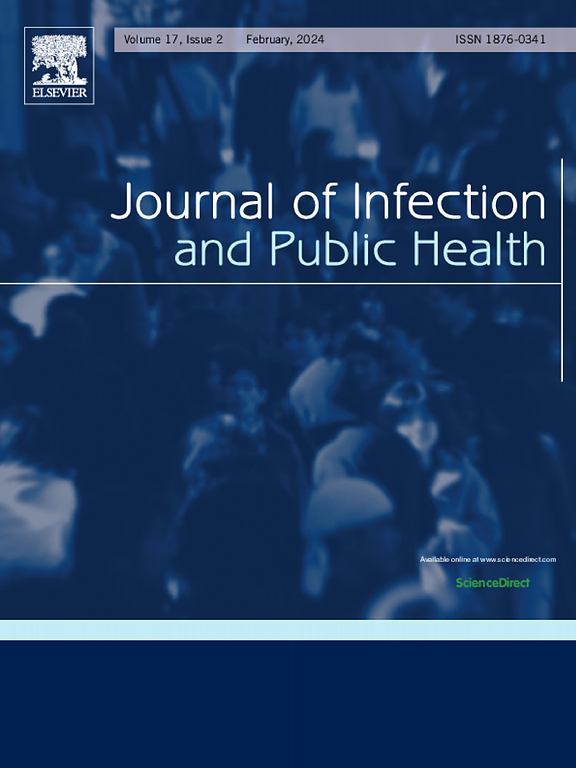Risk of evolution driven population-wide emergence of mpox: The paradoxic effect of moderate interventions
IF 4
3区 医学
Q1 INFECTIOUS DISEASES
引用次数: 0
Abstract
Background
The global mpox outbreak in 2022 was declared a public health emergency of international concern. While in non-endemic countries disease spread remained limited mostly to a high risk group, a main public health concern is that through evolution, mpox gains the ability to widely spread in the entire population.
Methods
We construct a stochastic epidemiological model of SEIR type, to investigate the spread of mpox primarily propagating within a core population — consisting of MSM individuals having multiple sexual partners — before affecting the general population. We examine how effective various intervention strategies are in preventing this from happening. These non-pharmaceutical interventions include reducing disease transmission in the core population, in the general population, or in both. Our analysis encompasses the optimal timing for these interventions, considering the effects of early versus late intervention and the potential impact of different mutation patterns on disease spread.
Results
Our findings highlight that effective early intervention can be achieved with lower intensity, while delayed intervention requires stronger measures. Notably, our results reveal an intriguing phenomenon where moderate intervention could lead to worse outcome than no intervention. This counterintuitive outcome arises because moderate reductions may prolong transmission chains within the core group, leading to more opportunities for the pathogen to acquire mutations resulting in higher transmission potential in the general population.
Conclusions
A comprehensive understanding of the role of the core group in disease dynamics and the mutation patterns are crucial for developing tailored and effective public health strategies. The moderate intervention paradox suggests that to minimize the risk of population-wide emergence, it must be ensured that targeted interventions are highly efficient.
进化驱动人群范围内麻疹出现的风险:适度干预的矛盾效应
背景2022年全球麻疹疫情被宣布为国际关注的突发公共卫生事件。虽然在非流行国家,疾病传播仍然主要局限于高风险群体,但一个主要的公共卫生关切是,通过进化,痘获得了在整个人口中广泛传播的能力。方法构建SEIR型随机流行病学模型,调查m痘在影响普通人群之前,主要在核心人群中传播(由有多个性伴侣的MSM个体组成)。我们研究了各种干预策略在防止这种情况发生方面的有效性。这些非药物干预措施包括减少核心人群、普通人群或两者中的疾病传播。我们的分析包含了这些干预的最佳时机,考虑了早期和晚期干预的影响以及不同突变模式对疾病传播的潜在影响。结果早期干预力度小,干预效果好,延迟干预力度大。值得注意的是,我们的结果揭示了一个有趣的现象,即适度干预可能导致比不干预更糟糕的结果。出现这种违反直觉的结果是因为适度减少可能延长核心群体内的传播链,导致病原体有更多机会获得突变,从而提高在一般人群中的传播潜力。结论全面了解核心组在疾病动态和突变模式中的作用对于制定有针对性和有效的公共卫生策略至关重要。适度干预悖论表明,为了最大限度地减少人口范围内出现的风险,必须确保有针对性的干预措施是高效的。
本文章由计算机程序翻译,如有差异,请以英文原文为准。
求助全文
约1分钟内获得全文
求助全文
来源期刊

Journal of Infection and Public Health
PUBLIC, ENVIRONMENTAL & OCCUPATIONAL HEALTH -INFECTIOUS DISEASES
CiteScore
13.10
自引率
1.50%
发文量
203
审稿时长
96 days
期刊介绍:
The Journal of Infection and Public Health, first official journal of the Saudi Arabian Ministry of National Guard Health Affairs, King Saud Bin Abdulaziz University for Health Sciences and the Saudi Association for Public Health, aims to be the foremost scientific, peer-reviewed journal encompassing infection prevention and control, microbiology, infectious diseases, public health and the application of healthcare epidemiology to the evaluation of health outcomes. The point of view of the journal is that infection and public health are closely intertwined and that advances in one area will have positive consequences on the other.
The journal will be useful to all health professionals who are partners in the management of patients with communicable diseases, keeping them up to date. The journal is proud to have an international and diverse editorial board that will assist and facilitate the publication of articles that reflect a global view on infection control and public health, as well as emphasizing our focus on supporting the needs of public health practitioners.
It is our aim to improve healthcare by reducing risk of infection and related adverse outcomes by critical review, selection, and dissemination of new and relevant information in the field of infection control, public health and infectious diseases in all healthcare settings and the community.
 求助内容:
求助内容: 应助结果提醒方式:
应助结果提醒方式:


